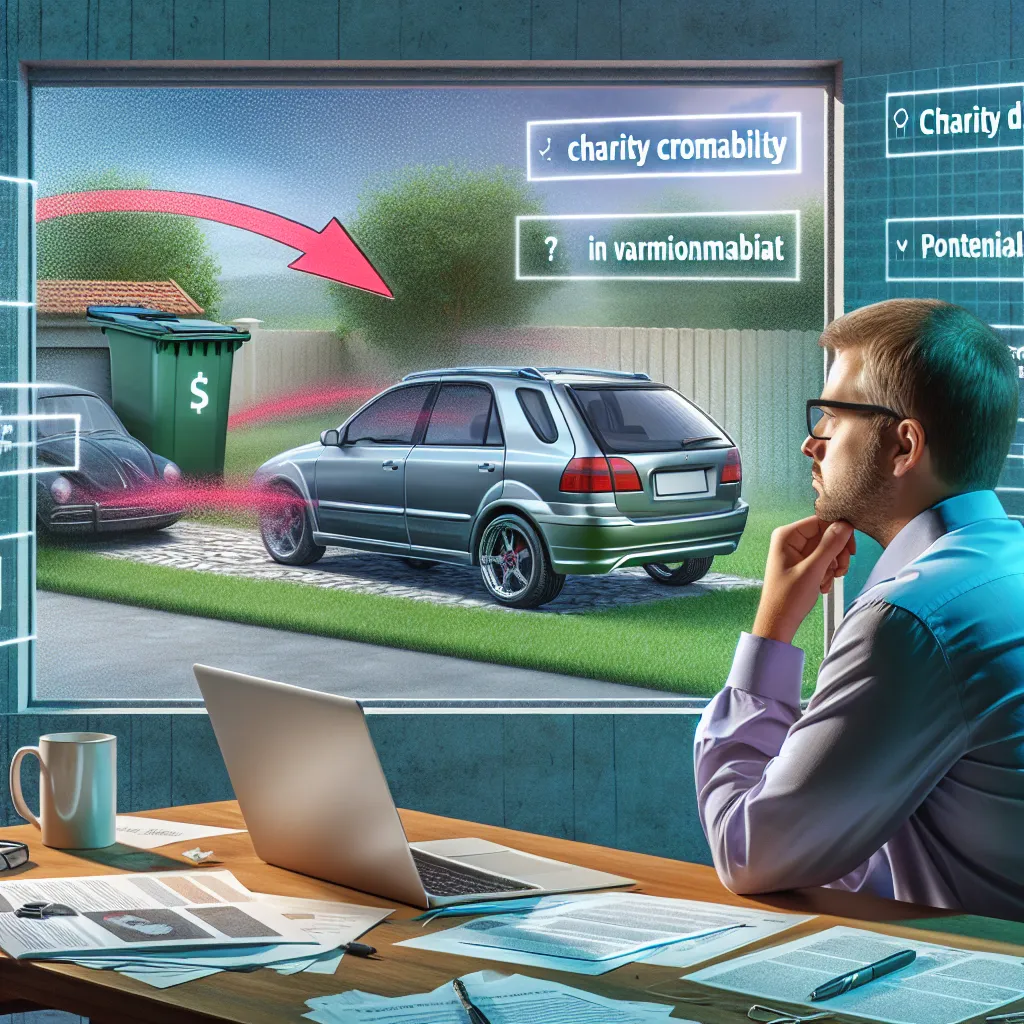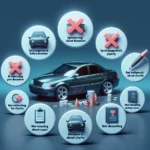Donating your car can be a powerful way to support a cause you care about, but it's essential to ask the right questions to ensure your donation makes the maximum impact.
- Understanding the Impact of Car Donations
- Key Questions for Socially Conscious Consumers
- Maximizing Tax Benefits Through Car Donations
- Selecting a Reputable Charity for Your Donation
- Ensuring Transparency in the Donation Process
- Guidelines for Claiming Tax Deductions
- Steps to Take Before Donating Your Car
- Making a Meaningful Impact with Your Donation
- Frequently Asked Questions
- Sources of the Article
Understanding the Impact of Car Donations
Donating a car is not just about getting rid of an old vehicle; it's about making a difference in the community. When you donate your car, the proceeds can fund various programs, from supporting families and children to aiding animal rescue operations. For instance, Jewish Family Service in San Diego uses car donations to fund programs for families, children, and older adults. Similarly, donating to an animal charity can help fund spay and neuter surgeries, rescue operations, and more.
However, not all car donations are created equal. The impact of your donation largely depends on the charity you choose and how they use the proceeds. Some charities may use the vehicle for their operations, while others may sell or auction it off. Understanding the charity's mission and how they plan to use your donation is crucial in ensuring your contribution makes a meaningful impact.
Before donating your car, it's essential to ask the right questions to ensure your donation is used effectively and you receive the maximum tax benefits. Here are three key questions to consider:
1. Does the Charity Have a Clear Mission and Provide Detailed Information About Its Programs?
A reputable charity should have a clear mission and be transparent about how they use donations. Research the charity's website, read their mission statement, and look for detailed information about their programs. If the charity is vague about how they use donations, it may be a red flag.
2. Is the Organization Registered with the IRS as a Tax-Exempt Entity?
To claim a tax deduction for your car donation, the charity must be registered with the IRS as a tax-exempt organization. You can verify the charity's status by checking the IRS's Exempt Organizations Select Check tool. Donating to a registered 501(c)(3) organization ensures your contribution is tax-deductible.
3. How Will Your Donation Be Used?
Understanding how the charity will use your car donation is crucial. Will they use the vehicle for their operations, sell it, or auction it off? Knowing this information can help you determine the potential impact of your donation and ensure it aligns with your values.
Maximizing Tax Benefits Through Car Donations
Donating your car can provide significant tax benefits, but it's essential to follow the IRS guidelines to maximize your deduction. Here are some tips to help you get the most out of your car donation:
Estimate the Fair Market Value of Your Car
The fair market value of your car is the price a willing buyer would pay for it. You can estimate this value using resources like Kelley Blue Book or Edmunds. If the charity sells the car, your deduction is limited to the sale price, even if it's below market value.
 Ultimate Guide to Car Donations for Charitable Individuals
Ultimate Guide to Car Donations for Charitable IndividualsCollect Necessary Documentation
To claim a tax deduction, you'll need to collect specific documents from the charity, including a written acknowledgment with your name, Social Security number, vehicle identification number, date of contribution, and details of any goods or services received. If the car sells for over $500, you'll also need an IRS Form 1098-C.
Itemize Your Deductions
To benefit from the tax deduction, you must itemize your deductions on your tax return. If you don't itemize, you won't be able to claim the deduction for your car donation.

Selecting a Reputable Charity for Your Donation
Choosing the right charity is crucial in ensuring your car donation makes a meaningful impact. Here are some tips to help you select a reputable charity:
Research the Charity
Take the time to research the charity thoroughly. Look for reviews, ratings, and testimonials from other donors. Websites like Charity Navigator and GuideStar can provide valuable insights into the charity's financial health and transparency.
Verify the Charity's Legitimacy
Ensure the charity is a registered 501(c)(3) organization and check their status with the IRS. Avoid donating to for-profit entities or organizations that are not transparent about their operations.
Understand How the Charity Uses Donations
Ask the charity how they plan to use your car donation. Will they use the vehicle for their operations, sell it, or auction it off? Understanding this information can help you determine the potential impact of your donation.
Ensuring Transparency in the Donation Process
Transparency is key in ensuring your car donation is used effectively. Here are some steps to ensure transparency in the donation process:
Get a Receipt for Your Donation
Always get a receipt for your car donation. The receipt should include your name, the vehicle identification number, the date of the donation, and a statement that no goods or services were provided in exchange for the donation.
Transfer the Title
Ensure you transfer the title of the car to the charity. This step is crucial in avoiding any liabilities associated with the vehicle after the donation.
 Top 5 Car Donation Mistakes to Avoid for Smart Budgeters
Top 5 Car Donation Mistakes to Avoid for Smart BudgetersFollow Up with the Charity
Follow up with the charity to ensure they received your donation and to get updates on how your car is being used. This step can provide peace of mind and ensure your donation is making a meaningful impact.
Guidelines for Claiming Tax Deductions
Claiming a tax deduction for your car donation can be a complex process, but following these guidelines can help simplify it:
Determine the Value of Your Car
Use resources like Kelley Blue Book or Edmunds to estimate the fair market value of your car. If the charity sells the car, your deduction is limited to the sale price.
Collect Necessary Documentation
Ensure you collect all necessary documents from the charity, including a written acknowledgment and IRS Form 1098-C if the car sells for over $500.
Itemize Your Deductions
To claim the tax deduction, you must itemize your deductions on your tax return. If you don't itemize, you won't be able to claim the deduction for your car donation.
Steps to Take Before Donating Your Car
Before donating your car, there are several steps you should take to ensure a smooth and successful donation process:
Research the Charity
Take the time to research the charity thoroughly. Look for reviews, ratings, and testimonials from other donors. Ensure the charity is a registered 501(c)(3) organization and check their status with the IRS.
Estimate the Value of Your Car
Use resources like Kelley Blue Book or Edmunds to estimate the fair market value of your car. This step can help you determine the potential tax deduction for your donation.
Collect Necessary Documentation
Ensure you collect all necessary documents from the charity, including a written acknowledgment and IRS Form 1098-C if the car sells for over $500.
 Maximize Your Tax Benefits: Donate Your Car for a Tax Credit Today!
Maximize Your Tax Benefits: Donate Your Car for a Tax Credit Today!Transfer the Title
Ensure you transfer the title of the car to the charity. This step is crucial in avoiding any liabilities associated with the vehicle after the donation.
Get a Receipt for Your Donation
Always get a receipt for your car donation. The receipt should include your name, the vehicle identification number, the date of the donation, and a statement that no goods or services were provided in exchange for the donation.
Making a Meaningful Impact with Your Donation
Donating your car can make a significant impact on the community, but it's essential to choose the right charity and follow the proper steps to ensure your donation is used effectively. By asking the right questions, researching the charity, and following the guidelines for claiming tax deductions, you can maximize the impact of your car donation and make a meaningful difference.
Frequently Asked Questions
How can I ensure my car donation makes a meaningful impact?
To ensure your car donation makes a meaningful impact, research the charity thoroughly, verify their legitimacy, and understand how they plan to use your donation. Choose a reputable charity with a clear mission and transparent operations.
What are the key questions to ask before donating my car?
Before donating your car, ask the charity about their mission, their IRS tax-exempt status, and how they plan to use your donation. These questions can help you ensure your donation is used effectively and aligns with your values.
How do I maximize tax benefits through car donations?
To maximize tax benefits, estimate the fair market value of your car, collect necessary documentation from the charity, and itemize your deductions on your tax return. Following these steps can help you get the most out of your car donation.
 Unlock the Secrets: How Car Donation Can Make a Difference Today
Unlock the Secrets: How Car Donation Can Make a Difference TodaySources of the Article
- New York State Attorney General - Donating your vehicle to charity
- TurboTax - How Do I Estimate the Value of My Donated Car for My Tax Deduction
- Consumer FTC - Before Giving to a Charity
- Credit Karma - 4 Things to Know Before You Donate a Car
- Animal League - Donate Your Car Or Vehicle To Animal Charity for Tax Credit
- Reddit - How do you actually go about donating a car and getting the most tax benefit
- Jewish Family Service - Donate Your Vehicle to JFS
- Car Donation Wizard - Donate a Car to SHIFT National Vehicle Retirement Initiative
- Consumer Reports - Rules for Last-Minute Donations to Charity
- Washington Secretary of State - Frequently Asked Questions by Organizations
If you want to know other articles similar to Car Donation: Key Questions for Socially Conscious Consumers you can visit the Car donation category.

